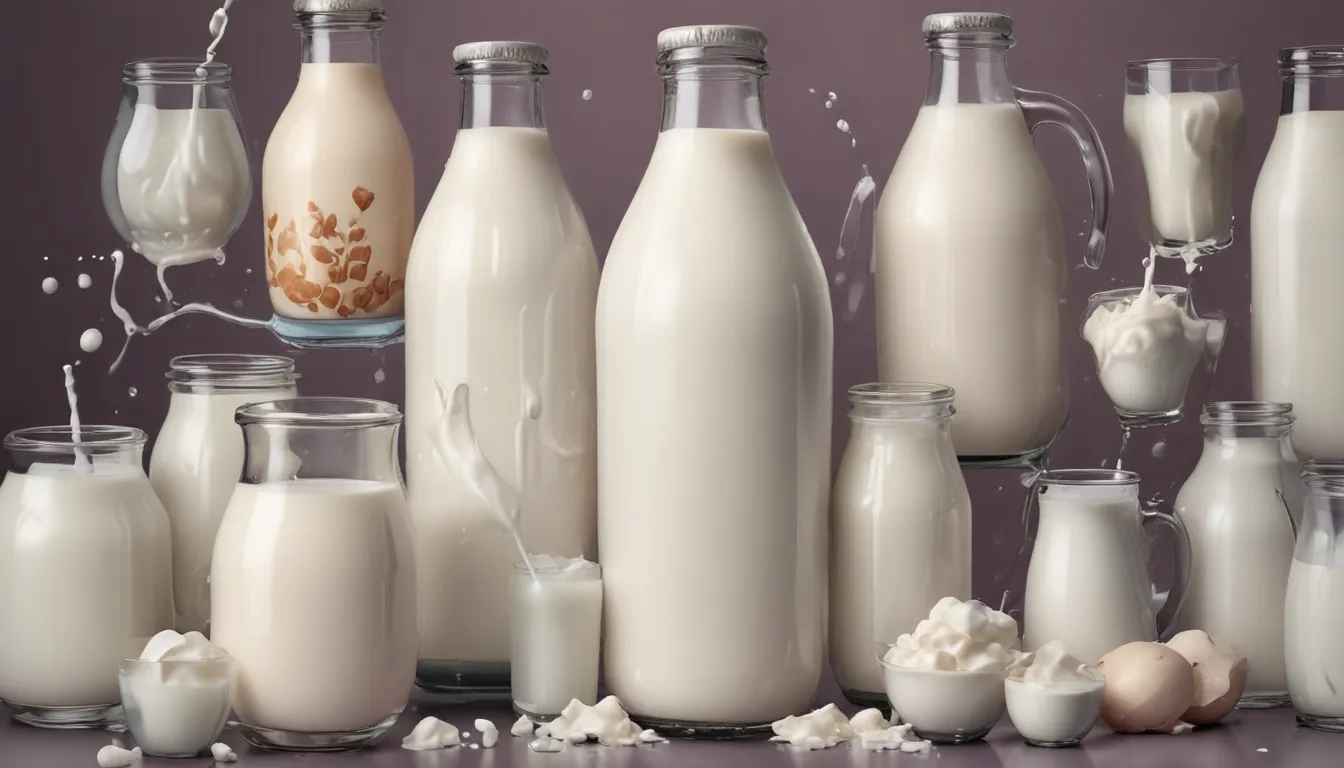The pictures in our articles might not always show exactly what the text is talking about. We use these images to make the article more interesting and eye-catching. They are there to add to the text, but not to replace it or show every detail.
Milk, a beloved beverage enjoyed by millions worldwide, has a rich history and remarkable benefits that go beyond its creamy goodness. From being a source of essential nutrients to playing a key role in various cultures, milk has secured its place as a timeless classic in our diets. Let's delve into 17 intriguing facts about milk that will deepen your appreciation for this dairy staple and unveil its secrets to a healthier lifestyle.
The Nutrient Powerhouse: Milk’s Essential Benefits
Milk packs a powerful punch when it comes to essential nutrients. It is rich in calcium, protein, vitamins, and minerals, making it a vital component of a balanced diet that promotes overall health and wellness.
The Diversity of Milk Sources
While cow's milk is the most commonly consumed type, it's worth noting that milk can also be sourced from goats, sheep, buffalo, and even camels. The variety of milk options available allows for individual preferences and dietary needs to be met.
A Timeless Tradition: Milk throughout History
The consumption of milk dates back thousands of years, with evidence of dairy farming tracing back to 6,000 BC. This timeless tradition continues to thrive as milk remains a staple in many cultures around the globe.
Building Strong Bones: The Calcium Connection
Calcium is crucial for maintaining strong bones and teeth, and milk is an excellent source of this essential mineral. Regular milk consumption can help prevent conditions like osteoporosis and ensure optimum bone health.
A Complete Protein Source: Fueling Growth and Repair
The proteins found in milk contain all the essential amino acids needed by the body for growth and repair. This complete protein source makes milk a valuable addition to a balanced diet that supports overall well-being.
Fortification for Added Benefits
Many varieties of milk available in the market are fortified with extra nutrients like vitamin D and vitamin A. These added vitamins enhance the nutritional value of milk, aiding in calcium absorption and promoting healthy vision.
Catering to Diverse Diets: The Range of Milk Options
From whole milk to low-fat, skim, and lactose-free options, there is a milk variant to suit various dietary preferences and needs. This diversity ensures that everyone can enjoy the benefits of milk without compromise.
Culinary Versatility: Milk in Cooking and Baking
Milk's versatility extends to the culinary world, where it is a common ingredient in a myriad of recipes. From adding moisture and texture to dishes to enhancing flavors, milk plays a pivotal role in creating delicious culinary delights.
Safety First: Avoiding Raw Milk Risks
Consuming raw milk can pose health risks due to potential bacterial contamination. To ensure safety, it is advisable to opt for pasteurized milk, which undergoes a process that eliminates harmful bacteria.
Nourishing Growth: Milk for Children
Milk is often recommended for children as it provides essential nutrients crucial for their growth and development. Its calcium and vitamin D content make it a valuable addition to children's diets, aiding in their overall well-being.
Preservation and Safety: Ensuring Milk Quality
Various methods, such as refrigeration, pasteurization, and sterilization, are employed to preserve milk and maintain its quality. These techniques safeguard against spoilage and ensure that milk remains safe for consumption.
Understanding Dietary Concerns: Allergies and Intolerance
It's essential to acknowledge that some individuals may have allergies to milk proteins or difficulties digesting lactose, the sugar found in milk. Fortunately, there are alternative milk options available to cater to those with specific dietary restrictions.
Indulging in Sweet Delights: The Appeal of Chocolate Milk
Chocolate milk, a popular flavored option, delights both children and adults alike with its rich, chocolaty flavor. By adding cocoa powder or chocolate syrup to regular milk, this sweet treat offers a delicious twist to the classic beverage.
Cultural Variances: Milk Consumption Worldwide
While milk is a dietary staple in many cultures, there are regions where traditional milk consumption is limited or nonexistent. This cultural diversity highlights the varied perspectives and practices surrounding milk and its significance.
Beyond the Beverage: Exploring Milk’s Controversies
The production and distribution of milk have sparked debates regarding animal welfare, sustainability, and environmental impact. These controversies underscore the importance of understanding the ethical considerations surrounding milk consumption.
Beauty Unveiled: Milk as a Skin and Hair Care Ingredient
Milk's nourishing properties extend beyond consumption and can be utilized in skincare routines, hair treatments, and soothing bath soaks. Its moisturizing and soothing effects make it a valuable beauty ally.
Conclusion: Embracing the Wonders of Milk
In conclusion, milk stands as a remarkable beverage with a rich history and an array of benefits. From its nutritional value to its cultural significance, milk continues to be a cherished part of households worldwide. Whether enjoyed plain, flavored, or incorporated into recipes, milk offers a versatile and delicious option for individuals of all ages. Let the many facts and benefits surrounding milk inspire you to savor each glass and treat with a newfound appreciation.
FAQs: Your Milk-Related Queries Answered
-
Is milk suitable for lactose-intolerant individuals?
Unfortunately, individuals with lactose intolerance may experience discomfort after consuming milk. However, lactose-free milk and dairy alternatives offer suitable options for those with intolerance. -
Which type of milk is the healthiest?
All types of milk, whether whole, reduced-fat, or skim, provide essential nutrients. The choice of milk depends on individual dietary preferences and requirements. -
Can milk be substituted with non-dairy alternatives in recipes?
Yes, non-dairy alternatives like almond milk, soy milk, and oat milk can serve as substitutes for milk in recipes. It's important to note that there may be variations in taste, texture, and cooking properties. -
What is lactose-free milk?
Lactose-free milk is regular milk treated with lactase, an enzyme that breaks down lactose. This process enables individuals with lactose intolerance to enjoy milk without digestive issues. -
How long does milk typically last?
The shelf life of milk varies based on storage conditions and milk type. Generally, unopened milk can last about a week past its expiration date, while opened milk is best consumed within a week.
Explore, Learn, and Trust
Each fact shared on our platform is a contribution from real users like you, ensuring a diverse and insightful collection of information. Our dedicated editors meticulously review submissions to maintain the highest standards of accuracy and reliability. Trust in our commitment to quality and authenticity as you embark on a journey of exploration and learning with us.
Enjoy the wonders of milk, embrace its benefits, and savor each moment of delight it brings to your table and beyond. Cheers to the timeless charm and nourishing essence of milk!






